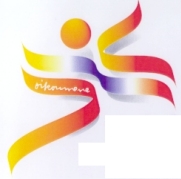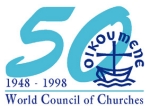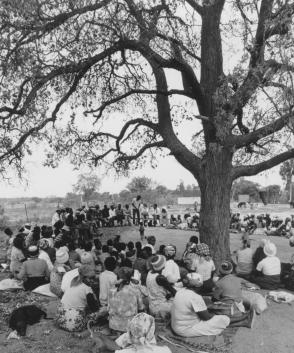

No. 8

|
WCC Anniversary and Eighth Assembly |

|
|
Feature Service No. 8 | ||
 en français
en français  auf Deutsch
auf Deutsch  en español
en español
The task of reclaiming and reinterpreting African tradition and culture will be central to their efforts. For the Zimbabwean peoples the ethos of one of their ancient traditions, that of the Padare, is all important. The Padare is about consensus through open dialogue and mutual respect.
"Dare" is the traditional Shona term which denotes the special meeting place which, before colonialism, functioned at many levels of Zimbabwean society.
Within the family, the "dare" was the time and place in which men met together, along with the boys of the household. It was a resting place and the place where they ate. It was also a place of counselling and formation where the older generation passed on wisdom to the young.
Women within a family also met together, but in a different place to the men. They called their meetings "Kutandare".
At the village level the Padare was also a mainly male grouping. Here, it provided community building, counselling of the young, and judicial decisions in the face of disputes.
The gender-specific character of these groups is not something that one would normally consider desirable today. However, there are other aspects to the Shona tradition of Padare which Zimbabweans are currently re-evaluating and reclaiming.
The "dare" was a place where all participants became equals. It was also a place of consensus; there was never a rush to reach decisions, for that would have prevented the building of community.
According to one young Zimbabwean woman I met recently, the primary value of the Padare tradition today lies in its potential to provide alternative ways of promoting peace, reconciliation and community.
The Eighth Assembly of the World Council of Churches, which takes place in this the Council's 50th anniversary year, offers a unique opportunity for church representatives from around the world to join with sisters and brothers in Africa. Together in Harare, Zimbabwe, from 3-14 December, they will seek to make real for a troubled continent the promise of Jubilee, which is about reconciliation, restoration and renewal.

It is no coincidence that the "dare" tradition ended during colonialism. During that period, the traditional chiefs were turned into civil servants who were paid by and accountable to the government rather than the people. Disputes were no longer solved in community but through the courts.
Zimbabweans today, like many other societies, cannot afford and do not want to romanticise their traditions or their past. Equally, they want to remember and respect their traditions and adapt them to new needs and circumstances.
With this in mind, the Zimbabwean hosts of the WCC's Eighth Assembly suggested the planned "open space" within the Assembly should be called Padare and that the central and most positive features of the Padare tradition - equality, consensus, and community - be its hallmarks.
The idea of an open space is not new to WCC assemblies, but the ethos of this space when conceived of as Padare brings a new dimension to the Assembly. In developing the Padare concept for the Assembly, the Planning Committee was struck by the potential of this tradition to provide a new model for the world. Padare is a style of dialogue and consultation which includes more rather than fewer people. It stresses the dignity and equality of all within the assembled company, and affirms unequivocally that, in the search for unity and understanding, the journey is as important as the destination, and the exploration and dialogue as vital as any decisions or conclusions.
The Padare model is particularly powerful because it symbolises the new thinking which now exists in the ecumenical movement. Recent ecumenical discussion places more emphasis on the quest for relationships than on structural and doctrinal agreement. The Padare offers some clues about how relations can be nurtured and community sustained even in the midst of disagreement and conflict.
By drawing from the best in Shona tradition and reflecting the importance given within ecumenical circles today to dialogue rather than decisions, the Padare promises to be a very important feature of the Assembly both symbolically and practically.
Over a period of five days, more than 400 events will form the Padare. Some will be seminars or workshops; others will make full use of the performing arts.
More than 40 arts presentations, including drama, dance, music and poetry, are planned for the university theatre. One presentation among many from the Zimbabwean hosts will be a full-scale theatrical presentation of the life of a local martyr.
In the Padare, visitors and delegates will consider the topic of globalisation and debt, and be urged to join hands with many around the world to campaign for the cancellation of debt for the poorest countries by the year 2000. The children of Harare together with children from every region will invite the churches to take a new look at the ways in which their work alongside children could give dignity and voice to the marginalised and exploited children of the world.
Justice and peace: including issues that arise for the church in a world marked by conflicts, violence and globalisation, and in the building of reconciled communities.
Unity: issues related to worship, spirituality, the visible unity of the churches and ecclesiology and ethics.
Moving together: issues related to communication within and of the ecumenical movement, to conciliar ecumenism and to an understanding of one ecumenical movement.
Learning: issues that arise in inter-religious relations and in Christian and ecumenical formation related to cultural and religious plurality.
Witness: issues which arise in communicating the gospel through health care, witness and evangelism, and around the problem of proselytism.
Solidarity: issues related to the churches' concern for the environment, the development of just and sustainable communities and for practical actions of empowerment and capacity-building.
Being an open space, the Padare is not a part of the formal decision-making structure of the Assembly. It will produce no written reports and make no recommendations. However, it is anticipated that many items discussed in the Padare will move the hearts and minds of those who take part, and who will then move on as delegates into the formal Assembly business sessions.
The Padare, as a place of encounter and dialogue, will therefore help ensure that the future perspectives and priorities of the member churches within the WCC genuinely reflect the concerns of ordinary Christians around the globe.
Besides concentrating on issues of justice and peace, the Padare will also tackle topics concerned with faith and unity, prayer, worship, the nature of the church, the shape of mission, and the relationship between Gospel and culture. In this context, major presentations will reflect on the outcome of the Fifth World Conference on Faith and Order held in Santiago de Compostela in 1993, and the Conference on World Mission and Evangelism held in Salvador, Brazil, in 1996.
Elsewhere in the Padare, across the six themes which give a conceptual framework to the space, a wide range of workshops will be on offer, including debates to mark the 50th anniversary of the UN declaration on human rights, and stories and testimonies from churches and communities around the world who try, in the face of fragmentation and violence, to promote a culture of peace.
Rev. Myra Blyth is a Baptist Minister from the United Kingdom and the Executive Director of the WCC's Unit IV: Sharing and Service. She is also the moderator of the group which is handling arrangements for the Padare. She is available for further comment and interview. Radio journalists please note that for interview purposes we have an ISDN line installed in our radio studio using a CCS Codec M66I 64K.
Use of the article must credit Myra Blyth as author. Editors are free to shorten the article if they wish but this should be acknowledged. Please send a copy of anything you publish for our records. Thank you.
The photograph to accompany this article is available upon request. Use of the photograph is free when used with the article. Other use will attract the usual WCC fees.
A good quality reproduction of the photo is available via Internet or ordinary mail. To order a photo via Internet, just click on it. That takes you to our Photo Oikoumene homepage. When you have located your photo, complete the online order form. Photo Oikoumene will send the photo electronically as an attached file, at 300dpi resolution, JPEG format.
If you want a colour slide, or colour or b/w photo by ordinary mail, send an E-mail inquiry to photo
Please also feel free to download the Assembly and 50th Anniversary logos directly from this page, or contact us if you wish us to airmail them to you.
John Newbury
Press & Information Officer
P.O. Box 2100
1211 Geneva 2, Switzerland
Tel.: (+41 22) 791 6152/51
Fax: (+41 22) 798 1346
E-mail: media
 Feature Service list
Feature Service list
 8th Assembly & 50th Anniversary homepage
8th Assembly & 50th Anniversary homepage
 Press Release list
Press Release list
 WCC homepage
WCC homepage